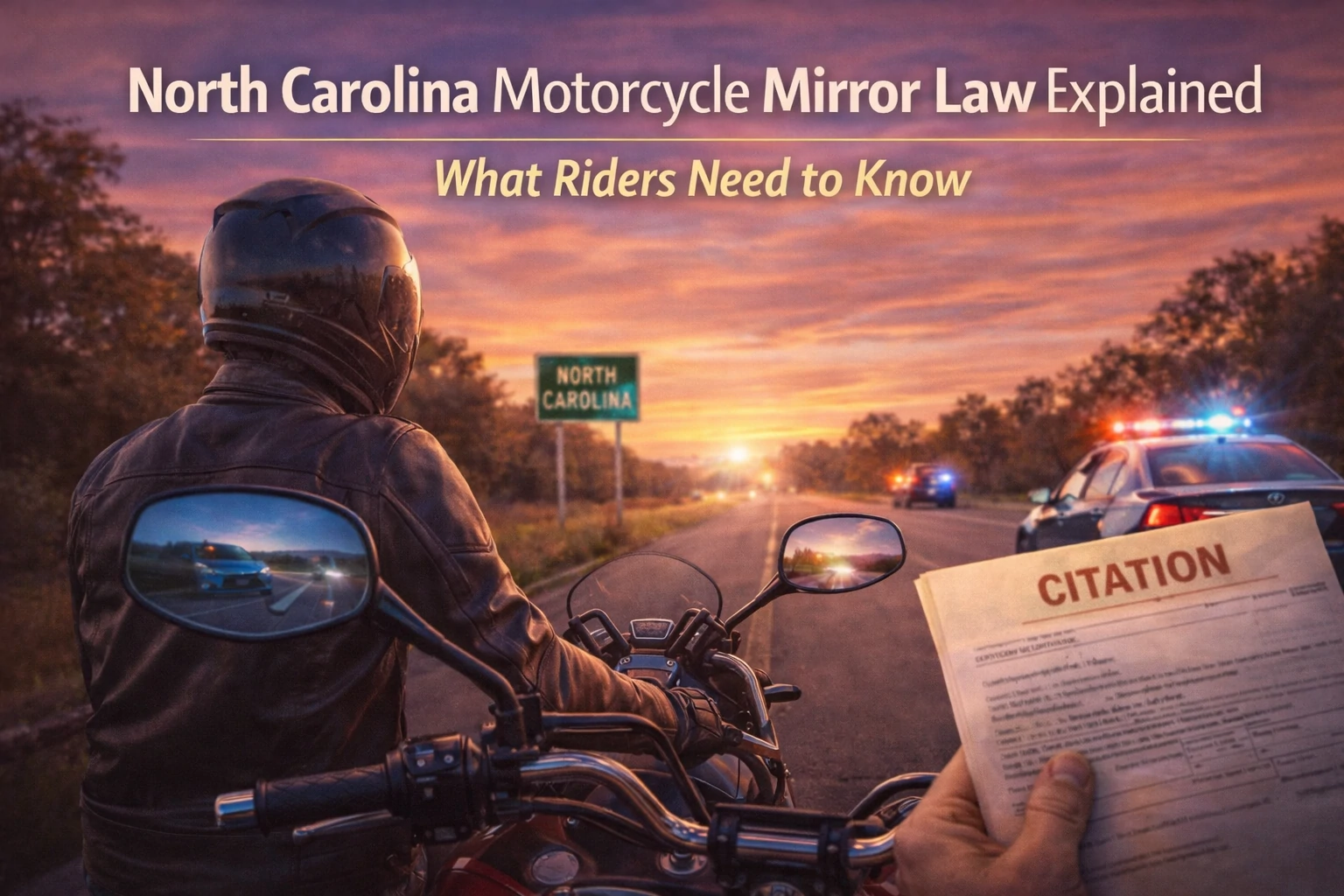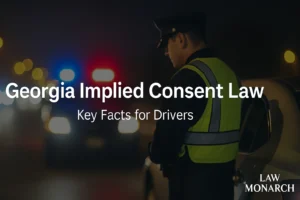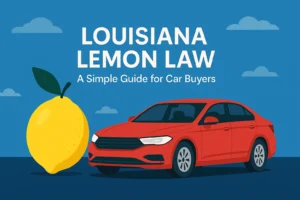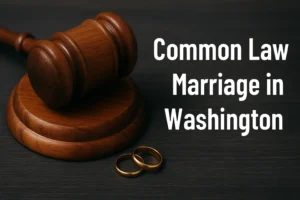Motorcycles offer freedom and speed, but safety laws keep that freedom in balance. Every state creates rules for riders, and North Carolina is no different. One question often comes up with new riders and seasoned bikers: do motorcycles in North Carolina need mirrors?
This question matters because a missing mirror can lead to legal trouble. Many riders overlook this part of the law until they face a ticket or a failed inspection. Knowing the mirror requirement helps you stay safe, avoid penalties, and keep your bike street legal.
This guide explains North Carolina’s mirror law in clear language. It also shows how mirrors protect riders and what steps you should take to stay compliant. With this knowledge, you will ride with confidence and avoid unnecessary risk.
North Carolina’s Mirror Requirement
North Carolina law states that every motorcycle must have at least one mirror. That mirror must provide a clear view of the road behind you. It does not matter if you ride a large touring bike or a small scooter. If it has two wheels and runs on public roads, it must have a working mirror.
The law allows only one mirror, but most riders use two. Two mirrors reduce blind spots and make lane changes easier. The left mirror gives you the most important view because it shows traffic that approaches from behind. Adding a right mirror increases safety and makes you more aware of surrounding vehicles.
Police officers often check mirrors during stops. If you lack a mirror or ride with a broken one, you may face a citation. That ticket can include fines and court costs. Keeping a proper mirror on your bike is simple and far cheaper than paying a penalty.
Why Mirrors Matter for Riders
Mirrors are not only about following the law. They are a major safety tool. A quick glance in the mirror helps you see vehicles before they get too close. This view helps you change lanes with confidence and avoid dangerous surprises.
Without mirrors, you must turn your head often. Each turn takes your eyes off the road. That small delay can lead to a serious crash. A good mirror allows you to stay focused on the road ahead while still keeping track of what happens behind you.
Insurance companies also consider mirrors during claims. If you ride without one and get into an accident, an insurer may reduce coverage. A simple piece of equipment can protect both your health and your wallet.
Mirror Placement and Style
North Carolina does not set limits on mirror size or design. You can use round, oval, or custom mirrors. The only rule is that they must provide a clear rear view. A mirror that looks stylish but fails to show the road is useless.
Many riders mount mirrors on handlebars. Others use bar-end mirrors that give a wider field of view. Both options work as long as they stay secure and functional. If you choose a custom build, check the mirrors before every ride.
Law enforcement does not care about the shape or brand of your mirrors. They only care that they help you see traffic behind you.
Penalties for Violating the Law
Riding without a mirror is a traffic offense in North Carolina. A police officer can issue a ticket on the spot. The fine is usually small, but it can grow if you have other violations on record.
A mirror violation can also raise your insurance rates. Some insurers view repeated equipment violations as a sign of unsafe riding habits. Even a minor ticket can create long-term costs if it stays on your driving record.
Courts often treat missing mirrors as proof of unsafe equipment. If you end up in an accident case, this can hurt your position. Avoiding these problems is simple: keep a mirror on your bike.
Vehicle equipment rules vary by state, and guides like Louisiana tint laws show how different regulations can be from one state to another.
Passing Motorcycle Inspections
Every motorcycle in North Carolina must pass an annual inspection. During this check, a licensed mechanic looks at all required safety equipment. Mirrors are part of this process.
If you show up with a missing or broken mirror, your bike will fail. You must fix the issue and come back for a re-test. This delays registration renewal and can add extra costs.
A quick check before inspection prevents this problem. Make sure the mirror is secure, free from cracks, and properly adjusted. A one-minute check can save you both time and money.
The Role of Two Mirrors
The law only demands one mirror, but most experienced riders prefer two. Two mirrors improve awareness and reduce blind spots. They also help in heavy traffic, where cars often move quickly and change lanes without warning.
Adding a second mirror is inexpensive but pays off in safety. Even riders with smaller bikes benefit from having mirrors on both sides. You can see more of the road, make better decisions, and reduce stress during your ride.
Riding with one mirror meets the legal standard. Riding with two mirrors meets the practical standard for safety.
Common Misunderstandings About the Law
Some riders believe that scooters or mopeds do not need mirrors. This is false. The mirror requirement applies to every street-legal two-wheel vehicle.
Others think that a helmet with a built-in rearview device can replace a mirror. That is also false. Helmets do not remove the legal obligation to mount a mirror on your bike.
Another myth is that officers do not enforce mirror laws. In reality, a missing mirror is one of the easiest violations to spot. Riders who ignore it risk tickets even during routine stops.
Staying Compliant and Safe
The best way to avoid mirror problems is to check your bike before every ride. Make sure the mirror is tight, clean, and properly aligned. Replace it if it shakes or fails to give a clear view.
Adding a second mirror is a smart move. It gives you a full picture of the traffic around you. Riders who stay proactive about safety have fewer problems with the law and fewer risks on the road.
A mirror is a simple piece of equipment, but it has a big impact. Riders who treat it as essential ride with more confidence and fewer surprises.
Riders should also stay informed about other traffic rules in the state, such as understanding gun laws in cars in North Carolina, to avoid legal issues on the road.
Conclusion
North Carolina does have a mirror law for motorcycles. Every rider must keep at least one working mirror on the bike. That simple requirement protects you, prevents tickets, and ensures your motorcycle passes inspections without delay.
A second mirror is not required, but it adds an extra layer of safety. Two mirrors give you a wider view and reduce blind spots, especially in heavy traffic. Taking a few minutes to check your mirrors before each ride keeps them functional and helps you avoid costly problems later.
Mirrors may look small, but they have a big impact on safety and legal compliance. When you follow the law and keep your bike in proper condition, you ride with confidence and peace of mind. Respect this rule, stay alert, and enjoy every mile on the open road without worry.
Questions Riders Ask (FAQs)
Q. How many mirrors do motorcycles need in North Carolina?
State law requires one mirror. Many riders install two for better visibility and safer lane changes.
Q. Can bar-end mirrors replace standard mirrors?
Bar-end mirrors are legal if they give a clear rear view. They must be secure and provide the same level of visibility as traditional mirrors.
Q. Will I fail inspection if my mirror is missing?
A missing or broken mirror will fail the state inspection. You must fix it before you can renew your registration.
Q. Does the law cover scooters and mopeds?
The mirror requirement applies to all two-wheel vehicles on public roads, including scooters and mopeds.
Disclaimer
This content is for informational purposes only and does not serve as legal advice. Motorcycle laws can change, and enforcement may vary. Review the latest North Carolina laws or speak with a qualified attorney for proper guidance.




